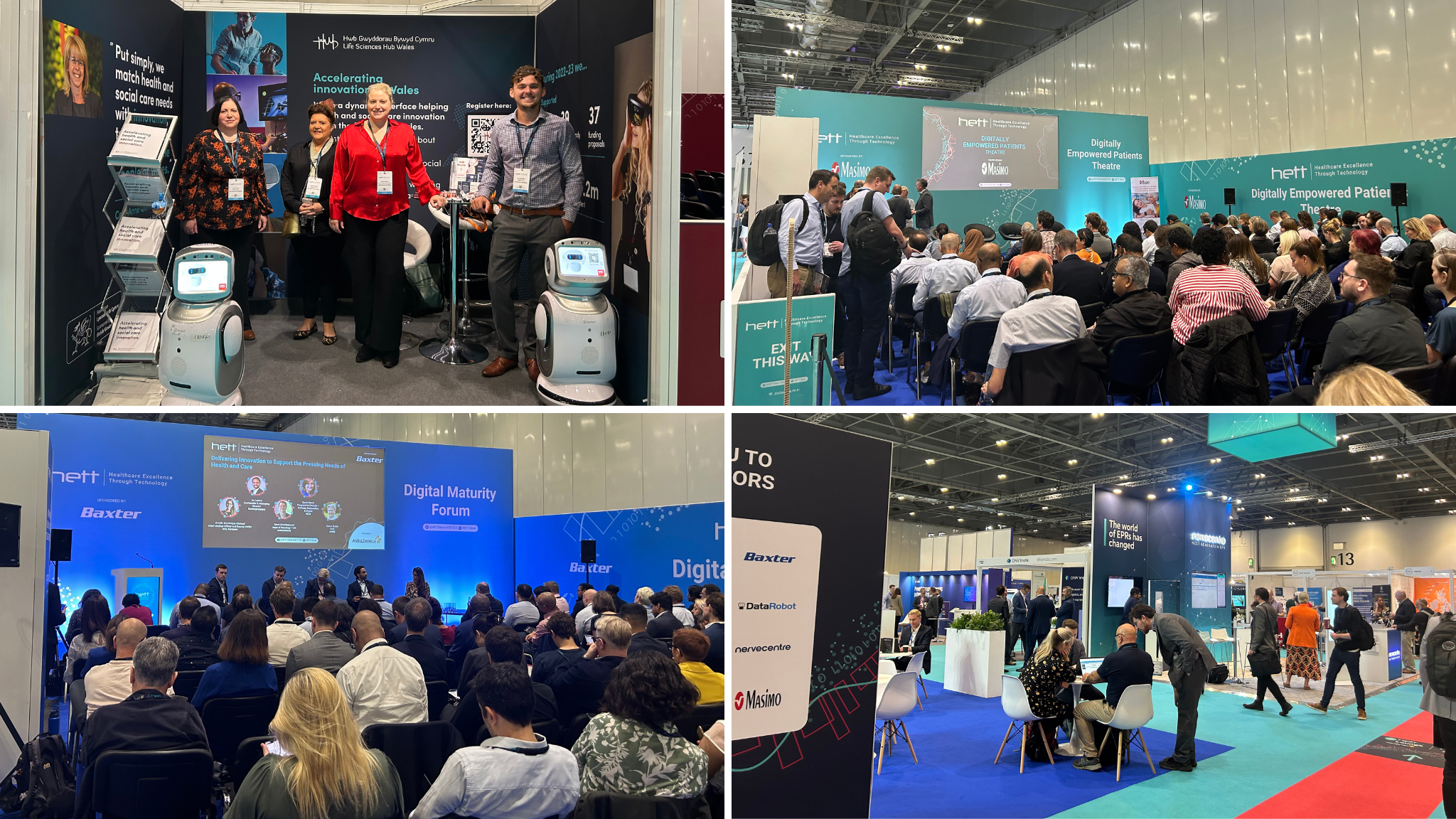We attended Healthcare Excellence Through Technology (HETT) London 2023 which gathered pioneers, innovators, healthcare professionals, and enthusiasts under one roof.

Many talks and discussion points focussed on the future of healthcare, highlighting key themes that are reshaping the landscape of patient care. This blog delves into the insightful discussions unfolding across this two-day event.
The development of digital apps in healthcare
Conversations about digitally empowered patients resonated throughout the conference. Liz Ashall-Payne, CEO at Orcha, emphasised the significance of digital apps within health and social care.
The conversation explored challenges around patient trust, app effectiveness, and affordability, shedding light on the complexities within the digital healthcare landscape. Liz mentioned that we must bust the myth of finding a ‘one best’ health app. She highlighted the diversity of patient needs and preferences, and that there are many health apps out there. It’s just finding what suits you and your needs, and educating your patients on the most effective and reliable ones.
Discussions arose around the NHS England app. Here, the communication function of the app enables patients to select preferences on care . However, there’s still a long way to go with its roll-out. Shanil Mantri, former GP & CCIO and Clinical Safety Officer, NHS Bath and North East Somerset, advocated for standardised data structures to support the app, envisioning a near future where patient-generated data seamlessly integrates into healthcare records. The independent NHS Wales App has also begun public beta testing.
Patient empowerment and care closer to home
Diane Deane-Bowers, a patient herself, shared her personal journey with managing glucose levels through innovative technology, emphasising the need for hospitals to embrace advancements like Patient-initiated follow-up (PIFU). This is an innovative technical device that is held against your left arm, which monitors your glucose levels.
The discussion resonated with the audience, prompting questions about the integration of technology into existing healthcare systems, and why some hospitals aren’t implementing these technologies. Patients would rather have the resources to monitor their condition, than going to a practitioner each time, instead only going when it’s needed. This will also save clinicians time on consultations.
Careology, a pioneering digital cancer care organisation, also took centre stage, illustrating how technology can support cancer patients at home. Paul Landau, Founder & CEO at, Careology, discussed Careology’s app being within a 12-month test and learn phase within the cancer centre.
This discussion centred around the importance of patient engagement and real-time data analysis. A component of the app involves patients registering their moods at home, temperature, any other incidents that have occurred since their last appointment. Doctors can subsequently access this information to proactively address patients’ needs.
Here, we saw yet another discussion which focused on technology advances saving clinician and patient time. The audience was captivated by the prospect of data-driven proactive care, reducing consultation times, and enhancing patient-doctor interactions.
Innovations in healthcare delivery also took a community-centric focus, across initiatives like at-home blood pressure monitors and mental health innovation platforms. Nausheen, GP and, PCN Digital Lead, discussed patients’ self-care and monitoring blood pressure within an app where GPs and patients can track and get in touch for an appointment where needed. These new advances mean that patients can better self-manage and feel in control of chronic long-term diseases.
Keeping care closer to home is something very important to our work too, such our work supporting a remote monitoring project for patients with heart failure.
Sarah Kendrick, Clinical Director at Mental Health Innovations, discussed the importance on their mental health innovation platform, where over 2,000 people are talking daily on their in-text app for those struggling or thinking of suicide. It provides the individual with a connection, and an opportunity for a place of calm. The integration of digital technologies and social media platforms like TikTok opened new avenues for patient engagement, especially among the younger demographic.
These sessions not only highlighted the incredible advancements in health and social care, but also points towards a patient-centric, and digitally integrated future. Now, the challenge is getting these advances to the frontline across the UK.
Chat GPT within health & social care
The transformative impact of Chat GPT, the advanced AI language model, resonated throughout the conference. With it almost being a year since its launch, visionaries like Ross O’Brien, HETT Working Group, Robin Carpenter, Governance Lead at, LMI & AI Centre for Value Based Healthcare, James Teo, Professor of Neurology and Clinical Director for Data and AI at, King’s College Hospital NHS Foundation Trust, and Sobath Premaratne, Vascular and Endovascular Surgeon at, Barts Health NHS Trust, delved into its practical applications within healthcare.
James discussed practical examples of incorporating Chat GPT within healthcare, from alerting, observational research, through to patient safety. Chat GPT was indicated as a valuable tool, offering a ‘fifth opinion’ in medical decision-making.
The discussion emphasised the need for digital literacy within hospitals and highlighted the necessity of top-down guidance, for safe and effective integration into healthcare practices. Technology such as Chat GPT is here to stay, and that’s inevitable. So, guidance is now needed to take this forward for frontline workers to be in a good position. It was also emphasised that Chat GPT isn’t going to take over jobs, although it will certainly help with supporting workload and tasks in healthcare. We just need an ecosystem that supports it better.
A key question arose from the audience, Chat GPT is at everyone’s fingertips, meaning that patient’s will get good at using AI. So, how can doctor’s catch up? The key answers acknowledged that doctors and clinicians need to learn as fast as them and, go along with the journey. Just because both sides are using it, this doesn’t mean that they’re using it well. Workers within healthcare need guidance on using it appropriately, and using it to their advantage. There should be a pathway created for undergraduates, and a learning environment which supports them in adapting and utilising AI, so that future clinicians should feel empowered by these technologies.
HETT 2023 highlighted the impact of healthcare technology and digital innovation. Gathering forward-thinking professionals, and cutting-edge technology which showcased the immense progress made in the healthcare sector. It’s evident that the collaboration between healthcare and technology holds unparalleled potential.
Transformative changes in healthcare delivery, with huge emphasis on patient-centric approaches and the need for a more inclusive healthcare ecosystem. We look forward to witnessing the impact of the ideas exchanged, and partnerships developed, as they continue to shape the future of healthcare, with digital being at the forefront.
If you didn’t meet us at HETT 2023 and want to learn more about how we can support you in propelling innovation to the health and social care frontline, then please get in touch by emailing hello@lshubwales.com.

